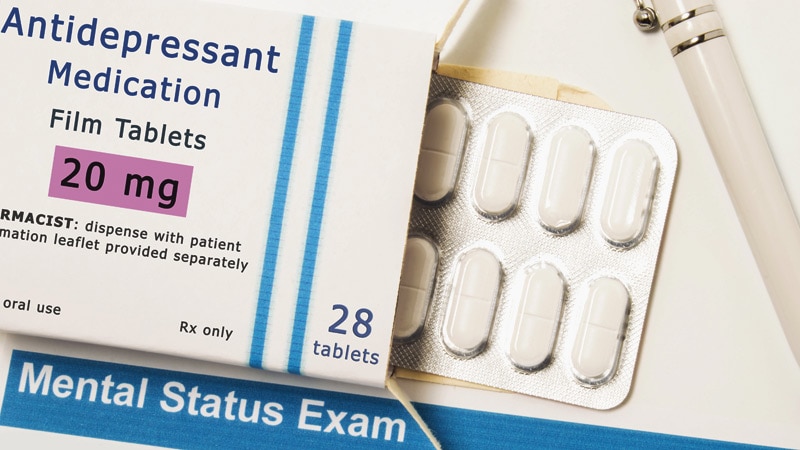Patients with obesity but without major depressive disorder or suicidal ideation within the previous 2 years attained meaningful weight loss with semaglutide, regardless of antidepressant use at baseline, in a post-hoc analysis of the Semaglutide Treatment Effect in People with Obesity (STEP) program.
Adverse events, including psychiatric events, were slightly more usual in the patients on antidepressants, Robert Kushner, MD, noted, in an oral session at Obesity Week 2023.
“It is very common that patients who present for weight management are taking antidepressants for various reasons, including depression, anxiety, insomnia, or chronic pain,” Kushner, from Northwestern University’s Feinberg School of Medicine in Chicago, told Medscape in an email. “We wanted to see if these participants responded differently to semaglutide compared to those not on antidepressants.”
“We found that antidepressants do not blunt the effect of semaglutide for weight loss,” he said. “However, there is a slight increase in reported adverse effects.”
“Semaglutide 2.4 mg provides an effective treatment option for weight management, regardless of antidepressant use at baseline,” Kushner summarized. “Clinicians should be assured that we can use semaglutide in this population of patients.”
Jack Yanovski, MD, PhD, said this was a “great presentation,” noting that “it’s really important that we understand what goes on in patients with depression.”
“Of course, all these trials still had rules that prevent the folks with the most severe depressive symptoms or past suicidality to participate,” added Yanovski, chief of the Growth and Obesity Section, Eunice Kennedy Shriver National Institute of Child Health and Human Development, Rockville, Maryland. “We need specific trials to know exactly how well we do.”
Kushner agreed, but also noted that ever since some earlier antidepressants were associated with risk for suicidal ideation and death, strict guidelines were put in place that exclude certain patients from participating in clinical trials.
Yanovski suggested that now that the drugs are approved, it would be possible to study this, and the information would be important for clinicians.
Kushner said he hopes that such studies are forthcoming. In the meantime, “data like this will add some support and understanding,” he suggested.
36,000 Patients With Obesity, 500 on Antidepressants
Many people living with obesity report taking antidepressants for depression, anxiety, chronic pain, obsessive–compulsive disorder, sleep disturbance, neuropathy, panic disorder, or posttraumatic stress disorder, Kushner noted.
However, some of these medications can cause weight gain, and little is known about treatment outcomes for people with obesity who are on antidepressants, since most weight-loss studies exclude people with active major depressive disorder.
The researchers analyzed data from 1961 patients in STEP 1 and 807 patients in STEP 2 as well as 611 patients in STEP 3 and 304 patients in STEP 5 — 3683 participants in total, of which 539 were on antidepressants at baseline.
The patients were randomly assigned to 2.4 mg semaglutide vs placebo plus a lifestyle intervention (STEP 1, 2, and 5) or intensive behavioral therapy (STEP 3 only), for 68 weeks, except STEP 5, which was 104 weeks.
Patients were included if they were aged 18 or older with a BMI ≥30 kg/m2, or ≥27 kg/m2 with more than one weight-related complication (STEP 1, 3, and 5) or BMI ≥27 kg/m2 with type 2 diabetes (STEP 2 only), and at least one self-reported unsuccessful effort to lose weight by diet.
They were excluded if they had active major depressive disorder within 2 years prior to screening (or other severe psychiatric disorders such as schizophrenia or bipolar disorder) or a Patient Health Questionnaire-9 score of 15 or higher (indicating moderately severe or severe depression), or suicide ideation (type 4 or 5 on the Columbia Suicide Severity Rating Scale) or suicide behavior, within 30 days of screening.
From baseline to week 68, patients on semaglutide (with/without baseline antidepressant use) had a significantly greater change in weight vs patients on placebo (with/without baseline antidepressant use), respectively:
-
STEP 1: –15.7% / –14.7% vs –0.2% / –2.8%
-
STEP 2: –10.7% / –9.5% vs –3.3% / –3.4%
-
STEP 3: –16.2% / –15.9% vs –5.0% / –5.9%
-
STEP 5: –19.0% / –14.1% vs +1.6% / – 4.0%
The proportion of reported adverse events was generally slightly greater in patients receiving semaglutide (with/without baseline antidepressant use) than those on placebo (with/without baseline antidepressant use), respectively:
-
STEP 1: 97.7% vs 88.6% and 92.9% vs 86%
-
STEP 2: 97.6% vs 86.5% and 88.6% vs 77.2%
-
STEP 3: 97.6% vs 95.3% and 100% vs 95.8%
-
STEP 5: 100% vs 94.8% and 95.5% vs 89.2%.
Gastrointestinal adverse events were more frequently reported in the semaglutide group and in patients on antidepressants at baseline. The proportion of patients with psychiatric adverse events was greater in participants on antidepressants at baseline. There were no differences in suicidal ideation/behavior in patients with/without antidepressant use at baseline.
The STEP trials were funded by Novo Nordisk. Kushner discloses that he served as a consultant for Novo Nordisk, WeightWatchers, Eli Lilly, and Pfizer, and received a research grant from Epitomee.
Obesity Week 2023. Oral 068. Presented October 16, 2023.
For more Medscape Diabetes and Endocrinology news, follow us on X (formerly Twitter) and Facebook
Source: Read Full Article
